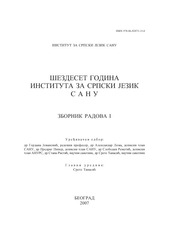Међуоднос футура I и футура II имперфективних глагола
The Correlation of Future I and Future II With Imperfective Verbs
| dc.creator | Ковачевић, Милош | |
| dc.date.accessioned | 2022-03-24T10:16:44Z | |
| dc.date.available | 2022-03-24T10:16:44Z | |
| dc.date.issued | 2007 | |
| dc.identifier.isbn | 978-86-82873-16-7 | |
| dc.identifier.uri | https://dais.sanu.ac.rs/123456789/12800 | |
| dc.description.abstract | У раду се анализира могућност (релативне) синонимске употребе футура I и футура II имперфективних глагола. Показује се како се у одређеним лексичко-синтаксичким условима футур II може употријебити У простој реченици у вриједности футура I. Синонимска употреба ова два глаголска облика могућа је, уз испуњење одређених услова, и у неколико типова зависних реченица, па чак и у адноминалним релативним нерестриктивним реченицама. | sr |
| dc.description.abstract | The article explores the possibility of relatively synonymous use of imperfective future I and future II in contemporary Serbian language. Analysis has shown that certain universally accepted Serbian and/or Serbo-Croatian statements on grammatical status and semantic correlation of the aforementioned verb forms should be revised. In this article the following has been proved: a) that future II can be used in a simple sentence with explicit adverb of manner mo`da 'maybe' along with presuppositional particle i 'too' e.g. Mo`a i on sutra bude i{ao na utakmicu 'He too may go to the game tomorrow' ; Mo`da i ona bude svirala u orkestru, 'She too may play in the orchestra tomorrow' , b) that two imperfective futures can be used synonymously in simple and subordinate clauses only if they are accompanied by adverb of manner mo`da and often by presuppositional particle i 'too': Mo`da i on sutra bude i{ao na utakmicu 'He too may go to the game tomorrow' // Mo`da }e i on sutra i}i na utakmicu, 'Maybe he too will go to the game tomorrow', c) that future I and future II of imperfective verbs can be used relatively synonymously in certain (sub)categories of subordinate clauses: adnominal relative restrictive clauses, adnominal relative non-restrictive clauses (only with explicit adverb of manner mo`da), relative clauses of concession and clauses of manner (exclusively in clauses of concession following (non)explicit pronoun to in adverbial expression bez obzira na to 'regardless of' and clauses of manner introduced by the conjunction kako 'as' and antecedent pronoun to or some other pronominal adverb), in temporal clauses (only those introduced by prije nego {to 'before'), d) in conditional clauses and adverbial clauses of concession (only those introduced by conjunctions ako 'if' and ako i 'if…too'), and declarative clauses (only those introduced by the conjunctions followed by verbs semantically implying uncertainty about realization of future action). | sr |
| dc.language.iso | sr | sr |
| dc.publisher | Београд : Институт за српски језик САНУ | sr |
| dc.rights | openAccess | sr |
| dc.rights.uri | https://creativecommons.org/licenses/by-nc-nd/4.0/ | |
| dc.source | Шездесет година Института за српски језик САНУ : Зборник радова I | sr |
| dc.subject | футур I | sr |
| dc.subject | футур II | sr |
| dc.subject | имперфективни глаголи | sr |
| dc.subject | синонимност | sr |
| dc.subject | проста реченица | sr |
| dc.subject | зависна клауза | sr |
| dc.subject | (не)извјесност реализације будуће радње | sr |
| dc.subject | Future I | sr |
| dc.subject | Future II | sr |
| dc.subject | Imperfective Verbs | sr |
| dc.subject | Synonymy | sr |
| dc.subject | Simple Sentence | sr |
| dc.subject | Dependent Clause | sr |
| dc.subject | (Uncertainty) of Realization of Future Action | sr |
| dc.title | Међуоднос футура I и футура II имперфективних глагола | sr |
| dc.title | The Correlation of Future I and Future II With Imperfective Verbs | sr |
| dc.type | bookPart | sr |
| dc.rights.license | BY-NC-ND | sr |
| dc.rights.holder | Институт за српски језик САНУ | sr |
| dc.citation.spage | 299 | |
| dc.citation.epage | 311 | |
| dc.type.version | publishedVersion | sr |
| dc.identifier.fulltext | http://dais.sanu.ac.rs/bitstream/id/51062/kovacevic.futur.2007.pdf | |
| dc.identifier.rcub | https://hdl.handle.net/21.15107/rcub_dais_12800 |

